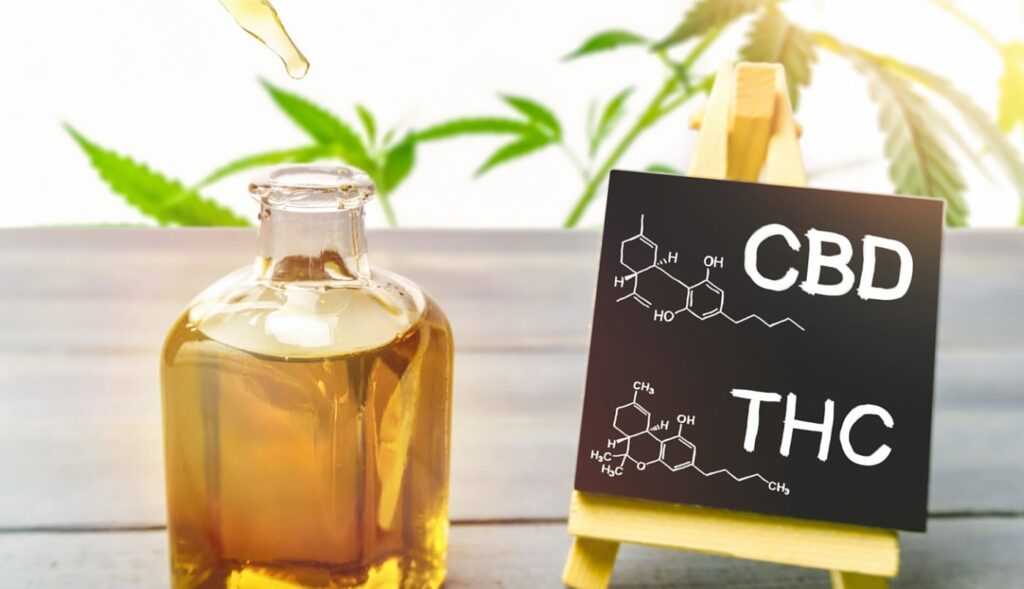CBD oil isn’t always just CBD. As with any extract, it can contain a number of other compounds, including THC.
This can prove complicated for producers and users. After all, CBD is legal under federal law, but THC is not.
But how much THC is in CBD oil, how does it get there, and is there anything you need to worry about as a consumer?
Does CBD Oil Have THC?
CBD (cannabidiol) is just one of many cannabinoids in the cannabis plant. CBD oil is made by extracting CBD from the plant and then diluting it with a carrier oil, such as hemp seed oil or coconut oil.
The amount of carrier oil used determines the strength of the product.
High-CBD cannabis plants are used to ensure maximum potency while keeping THC to a minimum. However, many extracts are “full-spectrum”, which means they contain all other cannabinoids in various trace amounts. They also contain terpenes, flavonoids, and other compounds found within the cannabis plant.
THC is one of these other compounds, so if you buy full-spectrum CBD oils, there will almost certainly be THC in the final product.
Broad-spectrum CBD products are similar to full-spectrum CBD products, but all traces of THC have been removed. The result is a product that contains the rich flavors, fragrances, and outcomes of varying cannabis compounds without any of the legal issues associated with THC.
CBD isolate is on the other end of the spectrum. It’s a refined product that has been purged of all THC and other cannabinoids and contains only CBD.
Do All Cannabis Plants Contain THC?
CBD and THC can be found in all cannabis varieties, but the concentrations vary significantly. A CBD extract taken from a high-CBD and low-THC strain will still contain trace amounts of THC, but not enough to be federally illegal.
What if CBD Oil Contains THC?
If hemp-derived CBD products contain more than 0.3% THC by weight, they are not legal under federal law. Even in states where marijuana has been legalized, there are additional rules governing its production, sale, and use that make life difficult for hemp growers.
If the product contains less than 0.3% THC, as is the case with full-spectrum oil, smokable hemp flowers, and most other products designed for legal consumption, it’s completely legal.
But the legal definition isn’t the only issue here.
If you are highly sensitive to THC, you may want to avoid all traces of this cannabinoid. The same is true for anyone who objects to the use of psychoactive substances or is concerned about the potential effects.
The biggest issue, however, is that trace amounts of THC can lead to a positive drug test result.
THC is fat-soluble, so it can accumulate in the body over time. Following a single use, you’re unlikely to encounter any issues. But if you’re taking large quantities of CBD oil every day, and you’re using full-spectrum extracts, you may fail a drug test.
Should I Use CBD Isolate, Broad-Spectrum Oil, or Full-Spectrum Oil?
Assuming there are no moral, religious, or physiological issues regarding THC, the option that works best for you will depend on a few factors:
- Full-Spectrum CBD Products: Ideal for users who want the full cannabis experience, potentially benefiting from something known as the “entourage effect”.
- Broad-Spectrum CBD Products: A good choice for users who want a full-spectrum extract without worrying about trace amounts of THC.
- Pure CBD Isolate: Best for users who are subject to regular drug tests, as well as those who aren’t interested in other cannabis compounds.
All of the CBD products you can buy are made from one of these three extracts. For instance, CBD gummies are often made using CBD oil. These colorful little treats are created using similar ingredients to the gummies in your local candy store, but with a few drops of CBD oil added.
Always check the product description/packaging to see what type of oil/extract was used and how much THC it contains.
Is There A CBD Oil That Contains THC?
Full-spectrum CBD products contain 0.3% or less THC, as this ensures they are legal under federal law.
Many users prefer full-spectrum products as cannabis is loaded with compounds that could have an impact on your health, including chemicals known as “terpenes” that are responsible for its flavors and aromas and are also found in other plants.
Which CBD Products Contain The Most THC?
Legal CBD products derived from hemp plants must always contain 0.3% or less of THC under federal law. There are many of these products on the market, including oils, edibles, smokables, and vapes.
Marijuana-derived CBD products may contain much higher concentrations of CBD, but the law doesn’t differentiate these products from cannabis buds and other high-THC products.
Will Full-Spectrum CBD Oil Always Show on Drug Tests?
As noted above, anytime you use THC-containing cannabis products, there’s a chance you will trigger a positive drug test.
There are some products and techniques out there that claim to “flush” your body of THC, but they don’t always work.
Everything from the type of product you use, how often you use it, and your physiology can impact how likely you are to trigger a positive test. The only guaranteed way to prevent such an outcome is to avoid taking any CBD product that contains THC.
Don’t assume you’ll be in the clear just because it contains less than 0.3%.
Is Full-Spectrum CBD Oil the Same as Medical Marijuana?
Medical marijuana contains a very high concentration of THC, often in the form of an extraction or as cannabis flowers. These products are derived from high-THC marijuana and may produce strong effects.
The THC in full-spectrum products, on the other hand, is too small to produce any kind of effect. It is not a replacement for medical marijuana.

